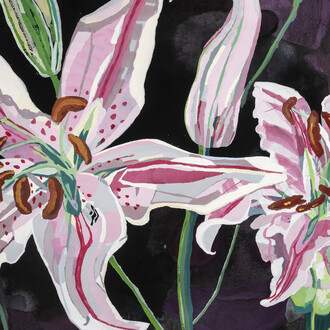David Morrison established his first national reputation as a printmaker; now he’s building a second national reputation as an astonishing realist within the venerable art of drawing. For proof: Just look at one of the drawings! For his third solo exhibition at Garvey|Simon, entitled Nature’s Ephemera, the artist offers visions of the natural world – an array of found sticks, logs for firewood, and wasp nests, found on walks in the semi-rural areas that surround Morrison’s house in central Indiana.
One of the commandments of creative writing is “write what you know.” In the case of David Morrison, the maxim transmutes as: draw what you know. Drawing becomes a deeper form of knowing, as knowing flows from a deeper form of looking. Morrison possesses a rare gift for assessing the visual surface and texture of reality. He shares his gift with us, the viewers of his drawings, and in our experience with his art we witness the intensity of his creative process. Controlling layers of translucent marks made by Prismacolor pencils – hour after hour after hour – Morrison produces a dense network of colors on a sheet of paper that slowly, magically, becomes a portion of the world transformed into a work of art. In one drawing we see, in breathtaking detail, how moss covers a tree limb, right above where the bark has started to peel open. In another drawing, we stare into the myriad white skeins of regurgitated wasp meal that congeal into a nest. His drawings trigger our perceptions refreshed by uncanny clarity: We see so deeply, it is as if we see seeing itself.
Morrison’s drawings are filled to the brim. There is meaning in how he draws and in what he draws. Such meaning connects each artwork to the world outside the drawing. In one drawing, birch bark peels open like a faded ribbon, or, more troubling, like a wound. In another drawing, I see a wasp’s nest loom as a symbol with spiritual significance. What I find so compelling: Morrison creates art that is both drawing and drawn. Substance and subject. The substance of colored pencil, strokes beyond counting, and, simultaneously, the almost dizzying density of existence itself: a log of birch. A segment of reality hovers in front of a sheet of paper, casting a luminous shadow; no matter how I shift my gaze, the portion of a tree limb, drawn with such precision, remains uncannily still. Nature is presented time bound and timeless.
Morrison belongs to a long, strong tradition. He calls to mind the early northern Renaissance artist Albrecht Dürer. Not only the Dürer who, too, was a preeminent printmaker, but the Dürer whose nuanced watercolors capture a hare hiding in plain view, or a patch of ground with tufts of grass. Or, of more recent vintage, one might contemplate connections between Morrison’s intense focus on the portrayal of a tree limb with the approach of Vija Celmins, in her exquisite paintings and drawings of the waves on an ocean, a spider’s web, a night sky of stars. We can say that Morrison extends the lineage of artists (think: John James Audubon) who pay homage to the natural world, and share a concern for its fragile components. Above I wrote that the level of detail in a Morrison drawing is “breathtaking;” it can be more than that: it can be heartbreaking.
Ultimately, we see Morrison as Morrison alone. Each drawing serves as the portrait of a sensibility that the artist slowly, lovingly, unravels through the end of a colored pencil. Producing a drawing for us to see.












